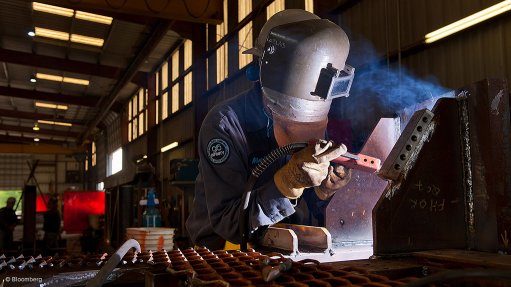
Photo by: Bloomberg
The National Employers’ Association of South Africa (Neasa) continues to criticise employer body, the Steel and Engineering Industries Federation of South Africa (Seifsa), during the latest round of industry wage negotiations, now accusing the organisation of “negotiating the industry into extinction”.
This followed reports on Friday that the National Union of Metalworkers of South Africa (Numsa) again rejected Seifsa’s latest wage offer, which included proposed increases of 10% in 2014, 9.5% in 2015 and 9% in 2016.
Meanwhile, Neasa – representing 3 000 mainly small and medium-sized business in the metal industry – remained steadfast at 8%, saying a higher increase would cripple smaller businesses in the sector.
In contrast, Numsa was demanding pay rises of between 12% and 15%.
“Seifsa must be extremely disappointed that its negotiating partner, Numsa, [has rejected the offer]. For two decades, [Seifsa’s] weak approach has done irreparable damage to this industry, merely because it had the support of trade unions and big business. In this process, [it] has betrayed the interests of small business,” commented Neasa CEO Gerhard Papenfus.
He added that Neasa would not stand by passively while Seifsa “threw away” the future of small, medium-sized and microenterprises (SMMEs) at the negotiating table.
“In pleasing Numsa and big business, Seifsa has turned against SMME's in South Africa. It has, in fact, also turned against the interests of the economy and the poor, which cannot find work in this industry,” he asserted.
Responding to Neasa’s comments, Seifsa said the association’s “growing desperation” had resulted in Neasa spreading “a series of lies” about the federation.
Seifsa CEO Kaizer Nyatsumba dismissed “with the contempt that it deserves” Papenfus’s “wild” allegation that the federation had betrayed the interests of small business.
“Nothing could be further from the truth. Although some of the largest companies in our sector are also members of associations affiliated to Seifsa, the majority of our members are small companies employing fewer than 50 people. That constituency makes [up] 63% of the companies within the Seifsa fold and informs everything that Seifsa does,” he asserted.
He added that, despite some reports quoting anonymous sources as saying that Numsa had rejected Seifsa’s offer, the union had not yet officially responded.
“We are very disappointed that, despite having made our very best offer on Tuesday in a last-ditch effort to end the strike, Numsa has not yet given us a response. We made it plain to the union that Tuesday’s was the very last offer to be made by Seifsa, and that it would be removed from the table if it were not accepted.”
An arbitration process between Neasa and Seifsa would continue on August 4 after an earlier declaration of a dispute between the two parties over the structure of wage negotiations in the industry.